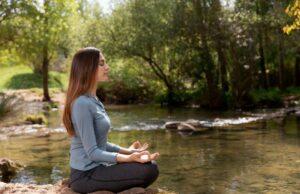Calmness is a state of being in which one is relaxed, composed, and free from stress or anxiety. It is a mental and emotional state that can be cultivated through various practises, such as mindfulness, meditation, and relaxation techniques.
Calmness can be beneficial for mental and physical health, as stress and anxiety can have negative effects on both. When we are stressed or anxious, our bodies release stress hormones that can lead to physical symptoms such as increased heart rate, shallow breathing, and muscle tension. By cultivating calmness, we can help to reduce the release of stress hormones and promote a sense of relaxation and well-being.
There are many different practises that can help cultivate calmness, including:
* Mindfulness meditation: This involves focusing your attention on the present moment, without judgement. By doing so, you can develop a greater sense of awareness and acceptance of your thoughts, emotions, and physical sensations, which can help reduce stress and anxiety.
* Deep breathing: Taking slow, deep breaths can help slow your heart rate, lower your blood pressure, and promote a sense of calmness and relaxation.
* Progressive muscle relaxation: This involves tensing and relaxing different muscle groups in your body, which can help to release tension and promote relaxation.
* Yoga: This is a physical practise that combines movement, breath, and mindfulness to promote physical and mental well-being.
* Listening to calming music: Listening to music that promotes relaxation and calmness can help reduce stress and anxiety and promote a sense of well-being.
By incorporating these practises into your daily routine, you can cultivate a greater sense of calmness and relaxation in your life. With dedication and practise, you can learn to manage stress and anxiety more effectively and experience greater overall well-being.
Calmness
Related Semantic Entities for Calmness



